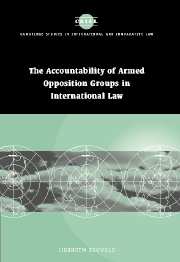Introduction
Published online by Cambridge University Press: 28 July 2009
Summary
This study examines the international accountability for acts committed by armed opposition groups during internal armed conflict. It aims to contribute to the improvement of the protection of civilian populations from abuses committed by these groups.
Armed opposition groups, as defined in this study, operate in internal armed conflict. These groups generally fight against the government in power, in an effort to overthrow the existing government, or alternatively to bring about a secession so as to set up a new state. The objectives of these groups may also include the achievement of greater autonomy within the state concerned. In other situations, where the existing government has collapsed or is unable to intervene, armed groups fight among themselves in pursuit of political power.
The degree of organization of armed opposition groups, their size, and the extent to which they exercise effective authority vary from one situation to the next. At one extreme, such groups resemble de facto governments, with control over territory and population. At the other extreme, they are militarily and politically inferior to the established government, exercising no direct control over territory and operating only sporadically. Some armed groups operate under clear lines of command and control; others are loosely organized and various units are not under effective central command.
Today, the majority of armed conflicts are internal, as opposed to international.
- Type
- Chapter
- Information
- Publisher: Cambridge University PressPrint publication year: 2002

